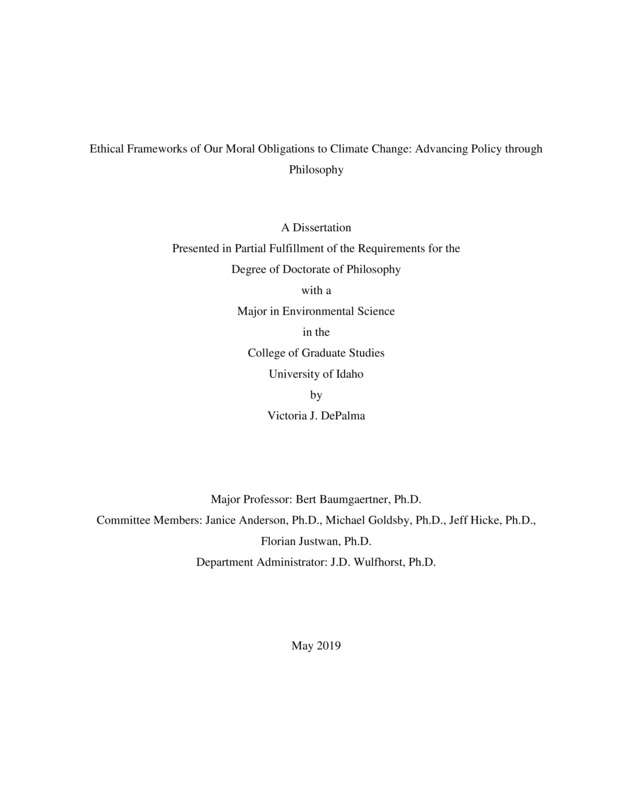Ethical Frameworks of Our Moral Obligations to Climate Change: Advancing Policy through Philosophy
DePalma, Victoria. (2019-05). Ethical Frameworks of Our Moral Obligations to Climate Change: Advancing Policy through Philosophy. Theses and Dissertations Collection, University of Idaho Library Digital Collections. https://www.lib.uidaho.edu/digital/etd/items/depalma_idaho_0089e_11577.html
- Title:
- Ethical Frameworks of Our Moral Obligations to Climate Change: Advancing Policy through Philosophy
- Author:
- DePalma, Victoria
- ORCID:
- 0000-0003-0695-3067
- Date:
- 2019-05
- Keywords:
- climate change perceptions ethical frameworks message framing policy analysis public opinion survey
- Program:
- Environmental Science
- Subject Category:
- Environmental science
- Abstract:
-
Climate change is a wicked problem. It is also a multi-faceted, interdisciplinary problem and needs to be understood as such to be solved. In this dissertation, I look at the ethical aspects of climate change to understand how ethics plays a role in the formation of policy and public opinions and perceptions.
First, I consider how various ethical frameworks can change the structure of carbon mitigation policy by analyzing the Kyoto Protocol and the Paris Agreement. The former structures carbon mitigation with rule utilitarian appeals, the latter uses virtue ethics and an appeal to reputation. Both aim for international carbon mitigation, but each choose unique ethical frameworks to structure how this is to be achieved. Other groups appeal to ethical frameworks in their mitigation strategies as well. For example, C40 Cities Climate Leadership Group, a conglomeration of cities working together to make their cities more carbon neutral, appeals to virtue ethic ideas. Governments—whether knowingly or not—appeal to ethical frameworks to evoke change. Some frameworks might do this better than others, so I seek to uncover what the effects of using varying ethical frameworks in policy formation might be.
Then, I consider whether individuals find certain ethical frameworks more appealing than others when used as reasons we should reduce the effects of climate change. After all, ‘ethics’ can be a vague term. If one were to frame an issue as ‘ethical’ there would be many ways to do this. In the same vein, it is unclear which ethical frameworks Americans make use of when considering climate change as an ethical issue. I consider three popular normative ethical frameworks.
There are three common frameworks by which once can justify a right action. Deontology focuses on following principles or one’s duty; utilitarianism focuses on maximizing favorable outcomes (or minimizing unfavorable outcomes); and virtue ethics focuses on the moral agent’s exemplification of excellent character. I use these three frameworks to frame messages about the individual’s ethical obligation to reduce the effects of climate change. In a nationally representative survey (n=1,202) I gauge Americans’ level of agreement to each statement, and determine which statement is most persuasive. By doing this, I investigate which ethical frameworks are most suitable for sub-groups of the American public. Results show that agreement with a deontological message is positively correlated with religiosity (p≤0.01). Further, with an increase in religiosity, there is a higher likelihood that a respondent will self-report that the deontological message is more persuasive than the utilitarian message (p≤0.001). These findings suggest that specific ethical frameworks have more persuasive appeal among some groups over others. I specifically show that there is an ethical reason to mitigate that the religious—a traditionally skeptical group concerning climate change—responds to.
Next, I further consider some nuances of Americans’ perceptions of climate change as an ethical issue. I measure whether (1) climate change beliefs are seen as ethical, and whether (2) decisions made to address climate change are seen as exercises in moral decision-making. While seemingly counter-intuitive, it is possible to think climate change has ethical ramifications without thinking it is human-caused or a serious problem. This and other findings are discussed, as well as what this means for future research.
This dissertation exemplifies how ethics can influence climate policy structure, and therefore its potential adoptability and implementation. I also show how ethics can be used as a message framing device to increase acceptance of climate change messages among skeptical groups. Lastly, I give insight into some nuances and specificities of Americans’ ethical perceptions of climate change. This research offers some new ways to use ethics as a tool to further understand and make applicable climate change ideas and objectives.
- Description:
- doctoral, Ph.D., Environmental Science -- University of Idaho - College of Graduate Studies, 2019-05
- Major Professor:
- Baumgaertner, Bert O.
- Committee:
- Justwan, Florian; Goldsby, Michael; Anderson, Janice; Hicke, Jeff
- Defense Date:
- 2019-05
- Identifier:
- DePalma_idaho_0089E_11577
- Type:
- Text
- Format Original:
- Format:
- application/pdf
- Rights:
- In Copyright - Educational Use Permitted. For more information, please contact University of Idaho Library Special Collections and Archives Department at libspec@uidaho.edu.
- Standardized Rights:
- http://rightsstatements.org/vocab/InC-EDU/1.0/

